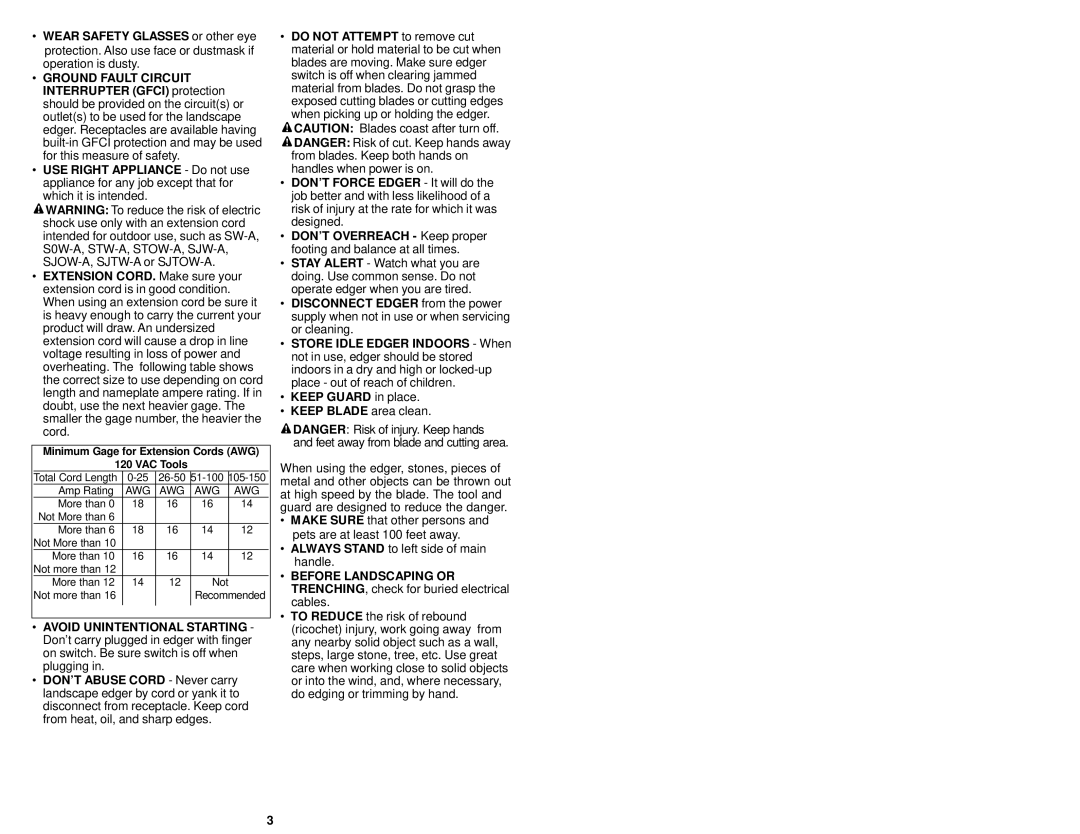
•WEAR SAFETY GLASSES or other eye protection. Also use face or dustmask if operation is dusty.
•GROUND FAULT CIRCUIT INTERRUPTER (GFCI) protection should be provided on the circuit(s) or outlet(s) to be used for the landscape edger. Receptacles are available having
•USE RIGHT APPLIANCE - Do not use appliance for any job except that for which it is intended.
![]() WARNING: To reduce the risk of electric shock use only with an extension cord intended for outdoor use, such as
WARNING: To reduce the risk of electric shock use only with an extension cord intended for outdoor use, such as
•EXTENSION CORD. Make sure your extension cord is in good condition. When using an extension cord be sure it is heavy enough to carry the current your product will draw. An undersized extension cord will cause a drop in line voltage resulting in loss of power and overheating. The following table shows the correct size to use depending on cord length and nameplate ampere rating. If in doubt, use the next heavier gage. The smaller the gage number, the heavier the cord.
Minimum Gage for Extension Cords (AWG)
120 VAC Tools
Total Cord Length | ||||
Amp Rating | AWG | AWG | AWG | AWG |
More than 0 | 18 | 16 | 16 | 14 |
Not More than 6 |
|
|
|
|
More than 6 | 18 | 16 | 14 | 12 |
Not More than 10 |
|
|
|
|
More than 10 | 16 | 16 | 14 | 12 |
Not more than 12 |
|
|
|
|
More than 12 | 14 | 12 | Not |
|
Not more than 16 |
|
| Recommended | |
|
|
|
|
|
•AVOID UNINTENTIONAL STARTING - Don’t carry plugged in edger with finger on switch. Be sure switch is off when plugging in.
•DON’T ABUSE CORD - Never carry landscape edger by cord or yank it to disconnect from receptacle. Keep cord from heat, oil, and sharp edges.
•DO NOT ATTEMPT to remove cut material or hold material to be cut when blades are moving. Make sure edger switch is off when clearing jammed material from blades. Do not grasp the exposed cutting blades or cutting edges when picking up or holding the edger.
![]() CAUTION: Blades coast after turn off.
CAUTION: Blades coast after turn off. ![]() DANGER: Risk of cut. Keep hands away from blades. Keep both hands on handles when power is on.
DANGER: Risk of cut. Keep hands away from blades. Keep both hands on handles when power is on.
•DON’T FORCE EDGER - It will do the job better and with less likelihood of a risk of injury at the rate for which it was designed.
•DON’T OVERREACH - Keep proper footing and balance at all times.
•STAY ALERT - Watch what you are doing. Use common sense. Do not operate edger when you are tired.
•DISCONNECT EDGER from the power supply when not in use or when servicing or cleaning.
•STORE IDLE EDGER INDOORS - When not in use, edger should be stored indoors in a dry and high or
•KEEP GUARD in place.
•KEEP BLADE area clean.
![]() DANGER: Risk of injury. Keep hands and feet away from blade and cutting area.
DANGER: Risk of injury. Keep hands and feet away from blade and cutting area.
When using the edger, stones, pieces of metal and other objects can be thrown out at high speed by the blade. The tool and guard are designed to reduce the danger.
•MAKE SURE that other persons and pets are at least 100 feet away.
•ALWAYS STAND to left side of main handle.
•BEFORE LANDSCAPING OR TRENCHING, check for buried electrical cables.
•TO REDUCE the risk of rebound (ricochet) injury, work going away from any nearby solid object such as a wall, steps, large stone, tree, etc. Use great care when working close to solid objects or into the wind, and, where necessary, do edging or trimming by hand.
3
